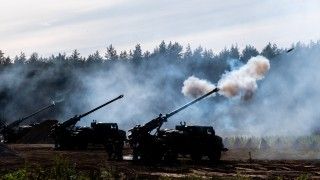- WIADOMOŚCI
Act on Homeland Defence Closer to Becoming a Definitive Document for the Polish Security
As announced by the head of the MoD, Mariusz Błaszczak, another step was made towards the introduction of the Act on Homeland Defence. It would contain several key changes in the functioning of the Polish Armed Forces and the Polish Ministry of Defence.

The Head of the Polish Ministry of Defence announced that inter-ministerial arrangements regarding the Act on Homeland Defence have been finalized. Błaszczak was to transfer the text of the Act for the consultation phase, at the Standing Committee of the Council of Ministers. The adoption of the new law would result in a significant increase in the number of troops serving in the Polish Armed Forces, as well as the levels of the defence expenditure.
Zakończyliśmy uzgodnienia międzyresortowe ustawy o obronie Ojczyzny. Skierowałem najważniejszą regulację dotyczącą Sił Zbrojnych RP pod obrady Stałego Komitetu Rady Ministrów. Dzięki ustawie znacznie zwiększymy liczebność Sił Zbrojnych RP i wydatki na obronność. pic.twitter.com/e0cEgMLcdy
— Mariusz Błaszczak (@mblaszczak) February 15, 2022
The Act on Homeland Defence - if assumptions are met - is to result in a comprehensive reform of the Polish defence policy. The bill was unveiled in late October last year by Deputy PM Jarosław Kaczyński, chairing the National Security and Defence Matters Committee of the Council of Ministers, along with the head of the MoD, Mariusz Błaszczak. The document contains several provisions pertaining to the reserve system, the improvement of service conditions, and finally - the increase of the defence expenditure.

The declarations made publicly by the Polish Ministry of Defence suggest that the Act would increase the number of troops serving in the military up to 250 thousand. They would be joined by a Territorial Defence Component - 50 thousand soldiers. Contrary to the Act on Reconstruction, Technical Modernization, and Financing of the Polish Armed Forces, the new bill does not list the number of soldiers directly. However, it contains numerous solutions that would make the service in the military far more attractive.
The first one is the establishment of voluntary military service - giving the volunteers a chance to spend up to 12 months in the military. The second, somewhat related to the first, is the introduction of the active reserves - reserves to the operational portion of the military, with a higher level of combat readiness. It is assumed that soldiers belonging to that component would serve once every quarter, for at least 2 days, during their time off their regular job, and at least once every 3 years, once for 14 days.

The bill also assumes that extra pay would be given to soldiers who have enough seniority. The service conditions for the candidates for officers are also to become far more attractive. Furthermore, the original bill also assumes that WKU (Army Recruiting Command) and WSzW (Voivodeship Military Staffs) would be liquidated. Instead, Voivodeship Recruitment Centers (Wojewódzkie Centrum Rekrutacji) would be established. Meanwhile, the Territorial Defence Forces would play a greater role in crisis management scenarios.
The Act on Homeland Defence is to increase the levels of defence expenditure. A level of 2.5% of GDP is to be achieved by 2026. Furthermore, Armed Forces Support Fund, a newly established one, would be used to finance the defence spending. The Support Fund could use funding sources that are beyond the state budget (e.g. the annual profits of the National Bank of Poland or the funds earned through the issue of the bonds by Bank Gospodarstwa Krajowego).















